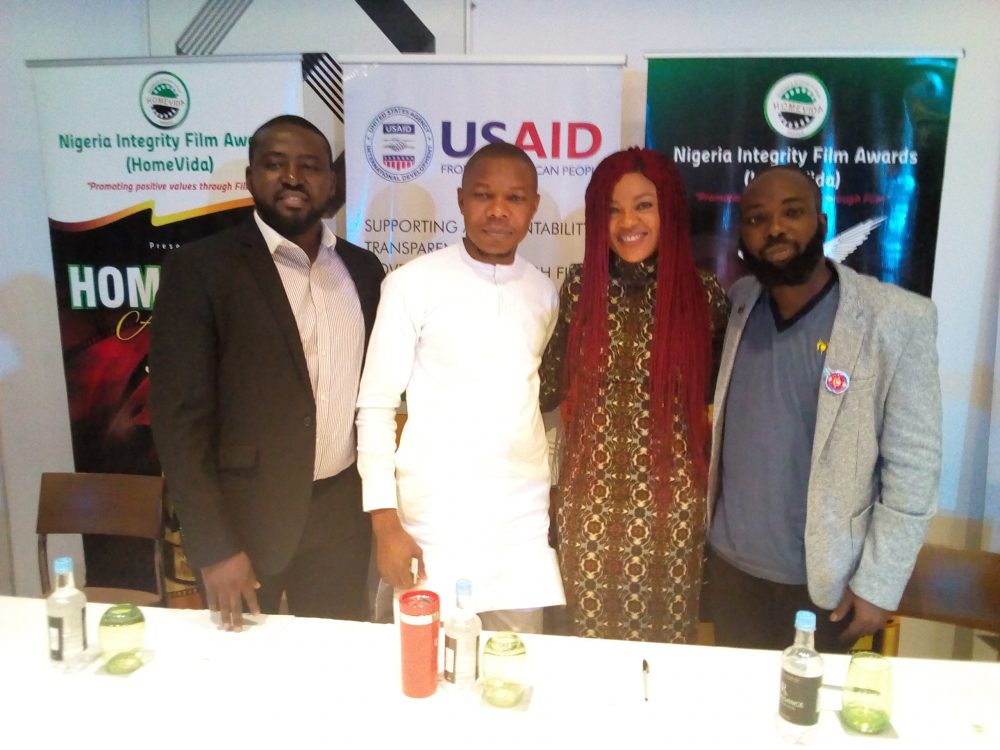Wives on Strike, a feature film produced by popular Nigerian actress, Omoni Oboli has been awarded the top prize in the Feature Film category of the 8th Nigeria Integrity Film Awards (HomeVida).
A 2016 comedy centred on the dangers of underage marriage, Wives on Strike beat stiff competition from Michael Nwankwo’s Politics and Money to clinch the top honour.
Also, Ishaya Bako’s Silent Tears, a 2015 documentary chronicling the horrors of gender-based violence in the FCT, was awarded the top prize in the Documentary category.
An award plaque and N1 million cash prize were presented to each recipient at an Award Night held at Renaissance Hotel, Ikeja, Lagos, on Saturday.
Earlier at a press briefing to announce the nominations, HomeVida’s Administrator, Mr. Samuel Umejiaku said that the annual award, which is in its eighth year, was initiated to promote values and raise awareness about social issues bedevilling the nation, adding that corruption was the focus of this year’s event.
Umejiaku noted that for the third year running HomeVida partnered with USAID SACE (Strengthening Advocacy and Civic Engagement) project to promote issues in transparency, accountability and good governance by rewarding the best feature film and documentary in these criteria.
He said, “We are looking to encourage Nollywood filmmakers to use the film to promote values, you know, social issues that are actually bothering us right now. This year, we are focusing on corruption.”
Umejiaku disclosed that over 122 feature films and documentaries were nominated for the award, after which a shortlisting was carried out by the award’s jury panel based on set criteria.
“After that shortlist, we did receive two short films in the Feature Film category – one, Wives on Strike by Omoni here and Politics and Power.”
He added that the winner of the category was chosen through voting by members of the public.
Speaking on her motivation for Wives on Strike, Omoni Oboli stated the film was conceived to primarily address issues of child rights in the country, while also touching on accountability in government and the importance of unity in achieving common goals.
She said, “Child rights issues is an issue that is very close to my heart.
“I can only imagine what these young girls have to go through.
“I don’t even think I can imagine it; you’ll have to go through it yourself to be able to know what they have to go through.
“We are talking about a 12-year-old being married off to 50-, 40- or even 30-year-old man.
“Her body is not formed and it is not time for her to go through that phase of life.”
She stated that despite the controversy surrounding underage marriage in Nigeria, the response to the film was overwhelmingly positive and encouraging.
Oboli disclosed that the sequel to the film will be released on December 29.
Also addressing the media, the producer of Silent Tears, Ishaya Bako, said that the documentary was shot to bring to light the harassment, intimidation, and extortion visited on women as a result of the activities of a multi-agency taskforce against sex workers in the Federal Capital Territory.
He said, “The Federal Capital Territory Administration (FCTA) acting through the Abuja Environmental Protection Agency which has the job of clearing the city of rubbish was tasked by the Minister of the FCT at the time to rid the street of sex workers.
“Since there’s no art or science to determine who a sex worker is, eventually what started to happen was that any woman would be picked up on the streets. They’ve been harassed and beaten up.
“Eventually it started getting closer to home.”
Bako disclosed that work on the project commenced in 2013 and took his team two years to put together.

